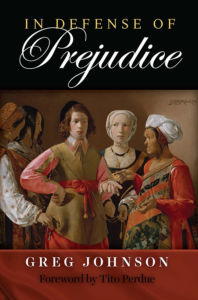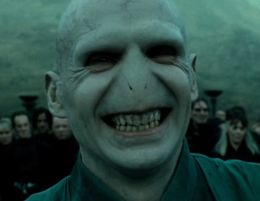Harry Potter & the Prisoner of the Trans Phenomenon
Posted By Morris van de Camp On In North American New Right | Comments DisabledJ. K. Rowling, the beloved author of the Harry Potter series of young adult novels, has come under considerable social scorn for her anti-trans stance. She’s had to return awards [2], has caused firestorms on Twitter, has been threatened by trans women, and has even been cancelled by the Harry Potter franchise that she created.
She was recently on a podcast to explain her views. She compared her pro-trans opponents to Death Eaters — the fictional paramilitary, magical bad guys in her books who live in secret until they come out in force when their side starts to gain power. In response, a Rowling critic, Sarah Barrett, wrote [3],
I have no interest in ever revisiting the Harry Potter books, but I’m pretty sure I remember why the Death Eaters were living in secret. It wasn’t because they were part of an oppressed group. It was because they chose to hate and hurt people who they saw as “lesser” and were rightfully punished for it. I definitely remember the Death Eaters’ philosophy wasn’t “you disagree with us, you must die.” It was more along the lines of, “You were born a certain way and because of that we want to terrorize you, cast you out of society and ultimately kill you.”
That sounds a lot more like one side of this “debate” than the other.
Barrett is, in fact, correctly reading the Harry Potter series’ message. Rowling poorly thought through the conflict at the center of her story — and since many younger people today learned their ideas about right and wrong from Harry Potter, this is a problem. First, there are the bad guys: Voldemort, the Death Eaters, and the Pure Blood snobs like Malfoy. Then there are the good guys like Professor Dumbledore and Harry Potter’s political faction in the Magical Community, who support a policy of integrating magic-capable individuals born of magically-challenged people into their world.
In other words, “discrimination” is bad and “tolerance” is good. Unfortunately, this idea is a narrow one upon which to base a vast — albeit fictional — conflict that has influenced so many in the real world. An entire generation has grown up reading Harry Potter, and as a result, they’ve become unable to recognize any evil other than “discrimination.”
Another fictional universe where we see a vast conflict in which the good and evil sides are made extremely explicit is Star Wars. Whereas the Rebel Alliance seems as pure as driven snow in the first film of the series, by the second, The Empire Strikes Back, the viewer begins to detect some of the Rebels’ moral flaws. Yoda, for example, tells Luke that he must “unlearn what he has learned.” Is that really good advice? Then, we discover that Obi-Wan lied about the fate of Luke’s father. And when it comes to the other side, Darth Vader’s motivations don’t seem so evil when he explains them himself: bringing peace and order to the galaxy.
We learn more in the prequel films — enough to introduce more ambiguity into which side is good and which is evil. The Jedi, despite professing to be apolitical, are interfering in government, and the Galactic Republic cannot protect its member planets from rogue operators such as the Trade Federation. Thus, there is no order in the galaxy under the Old Republic and the Jedi Order. When Qui-Gon (Liam Neeson) buys the young Anakin Skywalker as a slave, he doesn’t bother to buy his mother as well, and she is eventually captured and killed by the Sand People. The Jedi are indeed selfish, it seems, and their narrow interpretation of the religion surrounding the Force evinces moral blind spots.
The Harry Potter universe likewise offers greater insights in its prequels, but the revelations are not as insightful as those in Star Wars. We get only a glimpse of Voldemort’s ideology in the prequels, and it takes a great deal of thinking to realize it. In Fantastic Beasts and Where to Find Them, we discover a major plot hole: Should a magical person find himself in a non-magical environment and have his magical powers suppressed, he becomes an obscural [4] whose magical powers manifest in destructive ways. This problem must be dealt with by the magical authorities in all circumstances.
One can presume that Voldemort knows this. It is therefore highly illogical for him not to accept allowing Mudbloods such as Hermione Granger to be integrated into the Magical Community, since suppressed magic-capable Mudbloods will end up using magic in a harmful way, regardless. This is a major flaw in the rules of the Harry Potter universe.
 [5]
[5]You can buy Greg Johnson’s In Defense of Prejudice here [6]
In Fantastic Beasts, a bit more is revealed about the Voldemort faction’s ideology. The Magical Queenie Goldstein (Alison Sudol) has bewitched the American Muggle Jacob Kowalski (Dan Fogler) and caused him to love her. On the surface, this seems like a harmless interaction between the magical and non-magical worlds; after all, Queenie is an attractive woman and Kowalski is prime husband material, but there are considerable problems with this.
We can see that given these powers, a magical person can bewitch any Muggle for any reason. A scheming wizard could bewitch attractive Muggle maidens, turn heterosexuals into homosexual sex slaves, or create an enchanted army of Muggles to use as cannon fodder against another witch or wizard. The entire situation is fraught with the potential for exploitation, and is a great danger to both the Magical and non-Magical societies. Voldemort is therefore right to keep the Magical World away from the non-Magical one. Discrimination is often necessary. Grindelwald, the philosophical precursor to the Voldemort faction, likewise warns the magical ones against getting involved in Muggle conflicts, such as the pending Second World War.
The Harry Potter series is as much in the shadow of the Second World War as the rest of the English-speaking world, and this is another problem. The main part of the series has a narrative feel like that of Britain during the period between the two world wars. The Magical establishment fails to see the danger of Voldemort’s second coming in the same way that the British establishment, led by Neville Chamberlain and Lord Halifax, failed to see the danger of a resurgent Germany until it was too late.
But this narrative is wrong, of course: the Second World War happened because the British made a guarantee to Poland for its security which they could not back up. This caused the Poles to refuse to compromise when they could have, and 60 million people ended up dying, most of Europe’s cities were destroyed, and the British lost their empire. Britain’s guarantee to Poland was thus a diplomatic disaster.
J. K. Rowling’s angry pro-trans fanbase is itself the product of Rowling’s own simplistic portrayal of Harry Potter’s enemies as cartoon Nazis. The trans movement does not consist of “lesser” people who are hurt by hateful people like Rowling and her fictional Death Eaters. In fact, the trans movement is an evil ideology that is advancing under the umbrella of compassion and non-discrimination. Harry Potter’s Dumbledore/Potter faction would in fact likely endorse it if they were real people in the present day. Thus, the highly popularHarry Potterseries’ moral simplicity is a large part of why the trans contagion cannot be easily stopped.
The trans movement is a product of three interrelated phenomena: the sexual revolution, the spread of pornography, and social media. The sexual revolution and porn causes some men to want to become women. Some highly-competitive straight white men have become psychologically warped by girl-on-girl pornography to the degree that they become sexually aroused by imagining themselves as women. This condition is called autogynephilia [7]. If this were recognized for being what it actually is — a fetish — it could be dealt with accordingly. But since this fetish is prevalent among highly-competitive and often wealthy straight white men, they have sought to make it socially acceptable. In this they are being aided by ethnonationalist Jews — who are often fetishists themselves.
Then, there is transsexualism among girls and young women. Many girls feel awkward in their bodies; this is a natural thing that has probably been the case since time immemorial. With the onrush of social media, however, girls have fallen for bad advice from those who want to promote transsexuality. Girls also have a propensity to discuss their problems with their friends: This is called co-rumination. In many cases these interactions are normal and healthy, but should those involved hit upon a bad idea, it tends to spread. The ancient Greeks called this hysteria. A better term for this is social contagion. Young women are “possessed by demons,” get the shakes, see witches, and become anorexic under the influence of friend groups. Female-to-male transsexualism is a variation of that. Young women are permanently damaging their bodies, and society is nearly helpless in stopping them.
The feeling of angst that causes young women to transition is real, but the solution to their angst is not to turn into the opposite sex. They rather need to be coached through adolescence to accept what they are.
When the Harry Potter series was new in the early 2000s, many expressed concern that the American Religious Right would clamp down on the books due to their occult themes. This didn’t happen, however, probably because the Religious Right was then in the process of being discredited due to its close association with the George W. Bush administration. But the books’ fictional use of the occult wasn’t the real problem, anyway. It was rather the books’ morally simplistic framing of its fictional conflict in terms of “progressives” who are at war with those who “discriminate.” Had Voldemort’s ideology been given more nuance, it is possible that J. K. Rowling would have no men pretending to be women threatening her today.
* * *
Counter-Currents has extended special privileges to those who donate $120 or more per year.
- First, donor comments will appear immediately instead of waiting in a moderation queue. (People who abuse this privilege will lose it.)
- Second, donors will have immediate access to all Counter-Currents posts. Non-donors will find that one post a day, five posts a week will be behind a “Paywall” and will be available to the general public after 30 days.
- Third, Paywall members have the ability to edit their comments.
- Fourth, Paywall members can “commission” a yearly article from Counter-Currents. Just send a question that you’d like to have discussed to [email protected] [8]. (Obviously, the topics must be suitable to Counter-Currents and its broader project, as well as the interests and expertise of our writers.)
To get full access to all content behind the paywall, sign up here:
Paywall Gift Subscriptions
 [9]If you are already behind the paywall and want to share the benefits, Counter-Currents also offers paywall gift subscriptions. We need just five things from you:
[9]If you are already behind the paywall and want to share the benefits, Counter-Currents also offers paywall gift subscriptions. We need just five things from you:
- your payment
- the recipient’s name
- the recipient’s email address
- your name
- your email address
To register, just fill out this form and we will walk you through the payment and registration process. There are a number of different payment options.
